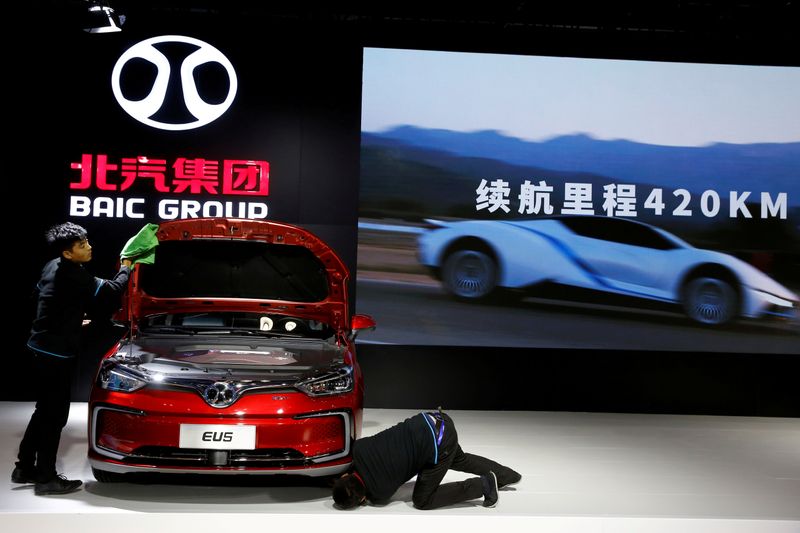By Julie Zhu, Edward Taylor and Yilei Sun
HONG KONG/FRANKFURT/BEIJING (Reuters) - Daimler (DE:DAIGn) is seeking to buy a majority stake in its Chinese operations, three people familiar with the matter told Reuters, after initial efforts to raise its stake failed and as Chinese investors tighten their grip on the German carmaker.
Daimler's moves come at a time of heightened tension between Berlin and Beijing as German lawmakers debate whether to bar China's Huawei from local 5G networks and as German companies look to ease Chinese ownership restrictions.
Daimler has been exploring several options to strengthen its control of Beijing Benz Automotive Co, its Chinese joint venture with BAIC Group, including a plan to raise its stake to 75% from the current 49%, two of the people familiar with the matter said.
Daimler faces some opposition within BAIC as the Chinese partner wants to maintain control of the highly profitable business that has benefited from strong sales of Mercedes-Benz cars and helped it fund expansion into other activities, sources, who declined to be named due to the sensitivity of the matter, told Reuters.
Daimler, which owns the Mercedes-Benz brand, declined to comment on its China expansion plans. BAIC did not respond to requests for comment.
CASH COW
Daimler's cash cow joint venture with BAIC is the main profit contributor of BAIC Group's Hong Kong listed company BAIC Motor Corp Ltd (HK:1958), which also has assets of BAIC's own brand cars and its joint venture with South Korea's carmaker Hyundai Motor (KS:005380).
In 2018, BAIC Motor reported 37.01 billion yuan (4.1 billion pounds) gross profit while that of Beijing Benz Automotive contributed 40.52 billion yuan, excluding the profit from the China JV, BAIC Motor was loss-making last year.
Beijing Benz Automotive, which started building and selling locally made vehicles in 2006, sold around 485,000 units last year, accounting for more than 70% of Mercedes-Benz's China sales.
In China, the world's biggest auto market, 525,890 Mercedes-Benz cars were sold in the first nine months this year, up 5% from a year earlier even as the total market keeps declining. Its German rival Audi sold 491,040 units and Munich-based BMW (DE:BMWG) sold 526,017 BMW and Mini-branded cars over the same period in China.
Daimler's stake purchase ambitions come as BAIC is pursuing a separate deal to buy a 10% stake in the German carmaker, sources told Reuters, to upstage Zhejiang Geely Holding Group, which owns a 9.69% Daimler stake.
If BAIC clinches a 10% shareholding, Chinese companies will control just under 20% of the luxury carmaker, enough to block significant decisions at Daimler's shareholder meeting, such as nominating directors or approving major investments.
These key decisions need at least 75% of votes cast at an annual general meeting, giving any shareholder with a 20% stake a blocking minority. At Daimler's 2019 annual general meeting, only 52.91% of the company's share capital was represented.
Daimler held talks with BAIC in 2018 about increasing its ownership of the China joint venture, but the talks petered out, prompting Daimler's management to ask Goldman Sachs (NYSE:GS) to explore ways to increase its 9.55% stake in BAIC Motor.
In 2018 Beijing started easing foreign ownership rules, allowing German carmaker BMW (DE:BMWG) to buy a 75% stake in its joint venture with Brilliance China Automotive Holdings Ltd (HK:1114) by 2022, when foreign firms will be permitted to control a non-electric passenger car company in China, prompting Daimler to pursue similar ambitions.
CHINESE INFLUENCE
Daimler has urged the German government to press Beijing to ease ownership restrictions to ensure a "level playing field," just as China's ambassador to Germany warned Berlin not to block China's Huawei from supplying German telecoms equipment.
The United States, which is embroiled in a global trade dispute with China, has urged German chancellor Angela Merkel to exclude Huawei from mobile equipment auctions on security grounds.
Huawei says it is an independent company and dismisses such concerns as baseless attempts by the United States to damage its business and reputation.
Last week China's ambassador to Germany, Ken Wu said Beijing could retaliate if Huawei was excluded from Germany's 5G rollout.
"If Germany were to take a decision in the end that would exclude Huawei from the German market, then it should expect consequences," the Chinese ambassador said at an event hosted by German business daily Handelsblatt.

"The Chinese government will not just stand by and watch. Look, 28 million cars were sold on the Chinese market last year, including seven million German cars. Could we say too one day that German cars are not safe – because we are capable of producing our own cars? No, this is pure protectionism."